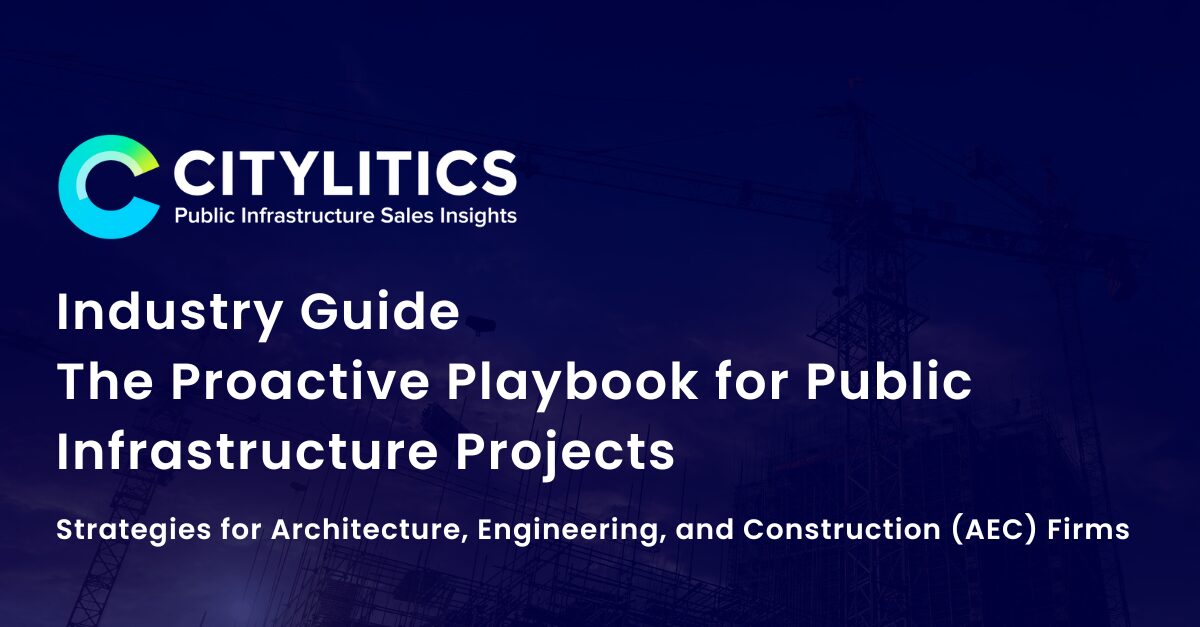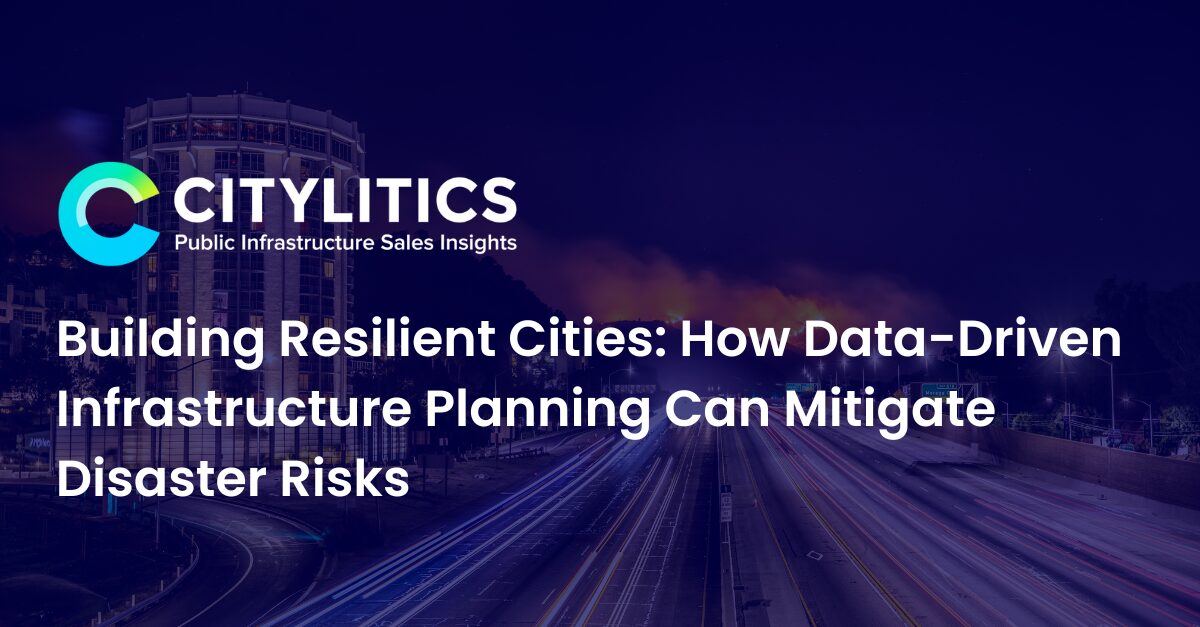Traditional business development tactics such as trade shows, travel, relationships, and project trackers are no longer enough to meet the demands of business development professionals in infrastructure industries. Industry professionals are now looking for new means of gaining the right insights to develop relationships and close deals.
Nothing could be more frustrating than hearing about opportunities late in the RFP process. It forces teams to scramble to respond and tends to produce low win rates. Early-Stage Sales Intelligence provides increased visibility as well as lead time to build and strengthen relationships and ultimately secure the win.
Early-Stage Sales Intelligence Reports vs. Bid Platforms
Early-Stage Sale Intelligence includes insights gathered from council meeting minutes, budgets, permits, capital plans, and government databases. As a result, Early-Stage Sales Intelligence reporting delivers strategically different insights from those available on bid platforms. Business development professionals are able to foresee when opportunities are beginning to emerge during the infrastructure investment lifecycle. This allows for adequate time to plan, budget, and allocate resources. Relationships can also be built and/or strengthened in time to educate clients, influence the upcoming opportunities, and establish differentiators well in advance of a bid. As a result, Early-Stage Sales Intelligence is a more tailored and strategic means of gaining opportunity insights on local utility and public infrastructure opportunities.
Bid platforms house public customer and/or project details in a way that can be directly accessed by infrastructure industry professionals and their teams. Often times, the intelligence provided in platforms includes opportunities out to bid at the RFP stage. The intelligence available in the platform depends on which platform is being used and can range from high level summaries and key words to more detailed reporting. Due to the amount of industry information captured in a bid platform, as well as the time spent filtering through “noise”, time may be spent weeding out irrelevant information rather than reaching out to potential customers. Some business development professionals have reported spending as many as 3-4 hours per day on bid platforms, which is time they could have spent connecting with best fit customers.
Benefits of Early-Stage Sales Intelligence
Business development teams who incorporate Early-Stage Sales Intelligence into their sales process also benefit from:
- Sustained higher project win rates of 30-50% more than previous approaches
- A tailored approach aligned with specific business development goals and intelligence needs
- Deeper insights and understanding of specific customer pain points
- Improvements over time with iterations made to search criteria
- A consultative approach that allows for discussion around a bigger picture
What are the Key Differences in Sales Tactics?
Early-Stage Sales Intelligence and bid platforms enable sales teams in different ways.
Early-Stage Sales Intelligence provides insights ahead of an opportunity. As a result, teams can plan strategically in accordance with their sales goals and unique offerings, with much more control retained over the resulting project spec and the prospect’s level of awareness at the time of the bid.
In contrast, bid platforms offer high-level market visibility, news on developments, and updates on projects out for bid. Sales teams can immediately begin activities such as reviewing project requirements and budgets and deciding on the go/no go to bid.
The following are five key differences in sales tactics that Early-Stage Sales Intelligence enables.
1. Build & Strengthen Relationships in Advance of the Bid
Many professionals in the infrastructure industry have a strong network of contacts, including prospective clients. The downside to having a wide network of contacts, however, is that it’s difficult to stay in touch regularly with all of those contacts.
Early-Stage Sales Intelligence allows teams to identify which contacts in their network they require a touchpoint with, and on a priority basis. It also helps prioritize time in light of busy schedules on both ends. Early-Stage Sales Intelligence also serves as a safety net in identifying opportunities where there hasn’t yet been a relationship established with the prospect, as well as providing new contacts following turnover of key decision makers. By flagging any gaps in relationships, teams have time to make valuable connections and educate the prospect on various industry solutions, including what makes their offering unique.
2. Prioritize Opportunities in Accordance with Upcoming Public & Utility Infrastructure Plans
In order to make informed business decisions and budget time and resources accordingly, sales teams need to be able to strategically prioritize which opportunities they’re going to pursue. Early-Stage Sales Intelligence allows teams to proactively evaluate upcoming opportunities based on public & utility infrastructure plans and then discuss within their organizations.
Sales teams can also leverage the time gained to align their messaging to these prospects in nuanced, strategic ways, helping to differentiate themselves before and later on during the RFP stage.
3. Conduct More Informed Prospect Meetings
One of the most important sales tactics prior to responding to an RFP is educating prospective clients on industry solutions and the unique value add your particular solutions brings. In some cases, local utility or public sector clients are simply unaware of what solutions are available to them, or in other cases, are unaware of the benefits public-private partnerships offer. Early-Stage Sales Intelligence delivers valuable insights into customer pain points – including steps they’ve taken – that can be leveraged to have meaningful conversations of a more consultative nature.
Given the amount of competition within the infrastructure industry, successfully educating clients ahead of time, and having a winning account strategy prepared ahead of the meeting are invaluable in positioning yourself for the win.
4. Validate your Sales Channel
In providing an accurate – and moving – picture of developments in the infrastructure industry, Early-Stage Sales Intelligence enables business development teams to confidently validate their sales channel. Maintaining market visibility is a critical concern of those in the infrastructure space and having an early picture of opportunities as they materialize is key to ensuring no opportunity is missed.
5. Follow-up on Opportunities
The ability to maintain an accurate view into new developments is also important when following up on opportunities. For opportunities being tracked, new insights on project developments or pain points offer a reason to reach out. Recent events and activity within the public entity or utility can help provide the right motivation for a solution and help to open dialogue, especially if the lead was felt to have gone cold.




